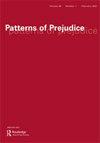Chosenness and its discontentsAdam Sutcliffe, What Are Jews For? History, Peoplehood and Purpose . Princeton, NJ and Oxford: Princeton University Press2020. vii+358pp. Notes. Ind. £35 hbk. ISBN 978-0-691-18880-5.
IF 0.8
2区 社会学
Q4 ETHNIC STUDIES
引用次数: 0
Abstract
ABSTRACTAdam Sutcliffe innovatively reinterprets modern Jewish intellectual history in terms of Jewish purpose. Where possible, he avoids judgemental discourse about antisemitism and emphasizes how Jewish thinkers have been participants, together with their Christian counterparts, in forming western self-understanding. In an approximately chronological order, he shows how the ‘underlying theological template’ of Jewish purpose, both in Jewish messianism and Christian millenarianism, has profoundly influenced modern thought, both religious and secular. The biblical model of the Jews as chosen people strongly influenced British and Dutch thought in the seventeenth century. Jewish purpose was of central interest to the Enlightenment, for good and ill; the French Revolution and the ‘progressive’ change of the nineteenth century led to further redefinitions of ‘what Jews were for’. Nationalism had its own effect, both in terms of Zionism and the various non-nationalist Jewish responses. At the same time, forms of normalization (including Zionism) proposed how Jews could fulfil their purpose by ‘fitting in’. Throughout the book, the dialectic between Jewish chosenness, particularity and difference on the one hand and, on the other, the claim that the Jews were chosen precisely to proclaim, and practise, universal values of ethics and social justice, frames a fascinating account of the ongoing debates about Jewish purpose. Sutcliffe rightly reminds us that the more inclusive, outward-looking, universalist model of Jewish purpose still has much cogency, despite being overshadowed of late by a narrower, inward-looking definition focused on the Holocaust and Israel.KEYWORDS: Christian ZionismJewish exceptionalismJewish purposeJewish universalismmessianismZionism Notes1 Salo Baron, ‘Ghetto and emancipation: shall we revise the traditional view?’, Menorah Journal, vol. 14, no. 6, 1928, 515–26 (526) (cited in Sutcliffe, 156).2 Eleanor Beardsley, ‘Alarm grows in France over anti-Semitic violence’, NPR Report, 3 May 2018, available online at www.npr.org/sections/parallels/2018/05/03/599515300/alarm-grows-in-france-over-anti-semitic-violence (viewed 3 August 2023).3 Robert Wistrich, Antisemitism: The Longest Hatred (New York: Pantheon 1992); Robert Wistrich, A Lethal Obsession: Anti-Semitism from Antiquity to the Global Jihad (New York: Random House 2010); David Nirenberg, Anti-Judaism: The Western Tradition (New York: Norton 2014).4 See Antony Lerman, Whatever Happened to Antisemitism? Redefinition and the Myth of the ‘Collective Jew’ (London: Pluto Press 2022); Steven Beller, Antisemitism: A Very Short Introduction (Oxford: Oxford University Press 2015); Ron Kampeas, ‘US Jewish scholars push anti-Semitism definition allowing more Israel criticism’, Times of Israel, 17 March 2021.5 Lessing’s play is seen as one of the great Enlightenment statements on the need for religious tolerance, and a template for later concepts of religious pluralism.6 The third of three Napoleonic decrees on Jewish matters in 1808, the ‘Infamous Decree’ is usually seen as having been a step backwards in Jewish emancipation in France by restricting Jews’ rights in Alsace.7 The Damascus Affair of 1840 was an international incident concerning the Blood Libel. Intervention by European powers, especially France and Britain, led to the release of several members of the city’s Jewish community, who had been falsely accused of baking matzo with the blood of a murdered Christian monk and his Muslim servant.8 The Eastern Question concerned what would happen to the political order of the Eastern Mediterranean and Middle East as a result of the decline and anticipated fall of the Ottoman Empire.9 See pages 91–2. The Spinoza Quarrel saw Jacobi attack Lessing and Moses Mendelssohn as ‘Spinozists’, rationalist, universalist cosmopolitans, whose friendship he saw as inauthentic, over against the primacy of faith and the particular, shared community of faith in which Jacobi saw the basis of true friendship, and indeed authentic truth.10 Freely paraphrased from several statements of Wilkins Micawber in Charles Dickens, David Copperfield (London: Bradbury & Evans 1850).11 On Weininger, see Allan Janik, Hitler’s Favorite Jew: The Enigma of Otto Weininger (New York: Simply Charly 2021); and Steven Beller, Vienna and the Jews: A Cultural History (Cambridge: Cambridge University Press 1989). On Bloch, see Ian Reifowitz, Imagining an Austrian Nation: Joseph Samuel Bloch and the Search for a Multi-Ethnic Austrian Identity, 1846–1919 (Boulder, CO: East European Monographs 2003).12 Tony Kushner, Angels in America: A Gay Fantasia on National Themes, revd edn (New York: Theatre Communications Group 2013), 290 (final line, emphasis in original).Additional informationNotes on contributorsSteven BellerSteven Beller was born in London, England in 1958. He was educated at Cambridge University. Since 1989 he has lived in the United States. He has written widely on Austrian, Jewish and Central European history. His books include Vienna and the Jews, 1867–1938: A Cultural History (Cambridge University Press 1989); Herzl (Halban 1991); Francis Joseph (Longman 1996); A Concise History of Austria (Cambridge 2006); Antisemitism: A Very Short Introduction (Oxford University Press 2008, 2015); Democracy: All That Matters (Hodder 2013). He also edited and introduced the anthology Rethinking Vienna 1900 (Berghahn 2001). His latest book is The Habsburg Monarchy 1815–1918 (Cambridge, 2018). He is currently an independent scholar resident in Washington D.C. Email: stevenbeller@aol.com《被选者及其不满》(萨达姆·萨特克利夫)《犹太人为何存在?》历史,人性和目的。普林斯顿,新泽西和牛津:普林斯顿大学出版社,2020。七世+ 358页。笔记。35万英镑。ISBN 978-0-691-18880-5。
【摘要】亚当·萨特克利夫从犹太人的目的出发,创新性地重新诠释了现代犹太思想史。在可能的情况下,他避免了对反犹主义的评判性论述,并强调犹太思想家是如何与基督教同行一起参与形成西方自我理解的。按照大致的时间顺序,他展示了犹太弥赛亚主义和基督教千禧年主义中犹太人目的的“潜在神学模板”是如何深刻影响现代宗教和世俗思想的。圣经中犹太人作为选民的模式强烈影响了17世纪英国和荷兰的思想。犹太人的目的是启蒙运动的核心利益,不管是好是坏;法国大革命和19世纪的“进步”变革导致了对“犹太人的意义”的进一步重新定义。民族主义有其自身的影响,包括犹太复国主义和各种非民族主义的犹太反应。与此同时,正常化的形式(包括犹太复国主义)提出犹太人如何通过“融入”来实现他们的目的。在整本书中,犹太人的选择、特殊性和差异与犹太人被选择来宣扬和实践道德和社会正义的普世价值之间的辩证关系,构成了关于犹太人目的的持续辩论的引人入胜的叙述。Sutcliffe正确地提醒我们,更包容、更外向、更普遍的犹太人目标模型仍然具有很大的说服力,尽管最近被一个专注于大屠杀和以色列的更狭隘、更内向的定义所掩盖。关键词:基督教犹太复国主义、犹太例外论、犹太目的、犹太普世主义、犹太复国主义注1萨洛·巴伦:《贫民窟与解放:我们是否应该修正传统观点?》,《烛台杂志》,第14卷,第2期。(引自Sutcliffe, 156).22 .埃莉诺·比尔兹利:《反犹太暴力在法国愈演愈烈》,美国国家公共电台报道,2018年5月3日,网址:www.npr.org/sections/parallels/2018/05/03/599515300/alarm-grows-in-france-over-anti-semitic-violenceRobert Wistrich,《反犹主义:最长的仇恨》(纽约:万神殿,1992);罗伯特·威斯里奇:《致命的痴迷:从古代到全球圣战的反犹主义》(纽约:兰登书屋2010);大卫·尼伦伯格,《反犹太教:西方传统》(纽约:诺顿出版社,2014)参见安东尼·勒曼的《反犹主义到底发生了什么?》重新定义和“集体犹太人”的神话(伦敦:冥王星出版社2022);史蒂文·贝勒,《反犹主义:简短介绍》(牛津:牛津大学出版社2015);Ron Kampeas,“美国犹太学者推动反犹太主义定义允许更多以色列批评”,以色列时报,2021年3月17日。5 .莱辛的戏剧被视为启蒙运动对宗教宽容需求的伟大声明之一,也是后来宗教多元化概念的模板1808年,拿破仑颁布了三项关于犹太人事务的法令,其中第三项是“臭名昭著的法令”,它通常被视为限制犹太人在阿尔萨斯的权利,是法国犹太人解放的倒退。欧洲列强,特别是法国和英国的干预,导致该市犹太社区的几名成员获释,他们被诬告用被谋杀的基督教僧侣和他的穆斯林仆人的血烤无酵饼东方问题涉及东地中海和中东的政治秩序将因奥斯曼帝国的衰落和预期的灭亡而发生什么变化。在斯宾诺莎之争中,雅可比攻击莱辛和摩西·门德尔松为“斯宾诺莎主义者”、理性主义者、普遍主义世界主义者,他认为他们的友谊是不真实的,与信仰的首要地位和特殊的、共享的信仰社区背道而驰,雅可比在信仰社区中看到了真正友谊的基础,以及真正的真理11 .自由改写威尔金斯·米考伯在《查尔斯·狄更斯,大卫·科波菲尔》中的几句话(伦敦:布拉德伯里和埃文斯出版社,1850)关于魏宁格,见艾伦·雅尼克,《希特勒最喜欢的犹太人:奥托·魏宁格的谜》(纽约:Simply Charly出版社,2021);史蒂文·贝勒,《维也纳与犹太人:文化史》(剑桥:剑桥大学出版社1989年)。关于布洛赫,见伊恩·雷弗维茨,想象一个奥地利国家:约瑟夫·塞缪尔·布洛赫和寻找一个多民族的奥地利身份,1846-1919(博尔德,CO:东欧专著2003)托尼·库什纳,《美国天使:关于国家主题的同性恋幻想曲》,修订版(纽约:戏剧传播集团2013),290页(最后一行,强调为原文)。史蒂芬·贝勒,1958年出生于英国伦敦。他在剑桥大学接受教育。自1989年以来,他一直住在美国。 他在奥地利、犹太和中欧历史方面著述颇多。他的著作包括维也纳和犹太人,1867-1938:文化史(剑桥大学出版社1989);赫茨尔(Halban 1991);弗朗西斯·约瑟夫(朗曼1996);《奥地利简史》(剑桥大学,2006);反犹太主义:非常简短的介绍(牛津大学出版社2008年,2015年);民主:一切都很重要(Hodder 2013)。他还编辑并出版了选集《重新思考1900年的维也纳》(Berghahn 2001)。他的最新著作是《哈布斯堡王朝1815-1918》(剑桥,2018)。他目前是华盛顿特区的独立学者。电子邮件:stevenbeller@aol.com
本文章由计算机程序翻译,如有差异,请以英文原文为准。
求助全文
约1分钟内获得全文
求助全文
来源期刊

Patterns of Prejudice
Multiple-
CiteScore
2.50
自引率
0.00%
发文量
11
期刊介绍:
Patterns of Prejudice provides a forum for exploring the historical roots and contemporary varieties of social exclusion and the demonization or stigmatisation of the Other. It probes the language and construction of "race", nation, colour, and ethnicity, as well as the linkages between these categories. It encourages discussion of issues at the top of the public policy agenda, such as asylum, immigration, hate crimes and citizenship. As none of these issues are confined to any one region, Patterns of Prejudice maintains a global optic, at the same time as scrutinizing intensely the history and development of intolerance and chauvinism in the United States and Europe, both East and West.
 求助内容:
求助内容: 应助结果提醒方式:
应助结果提醒方式:


